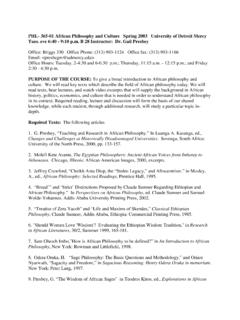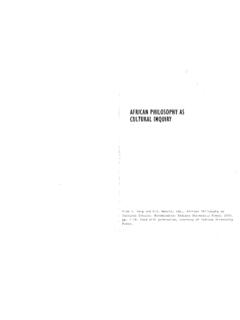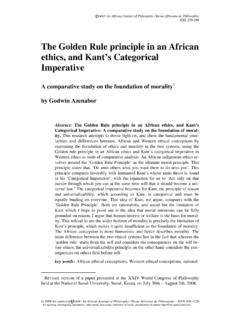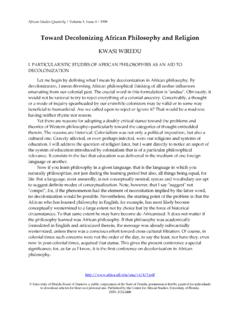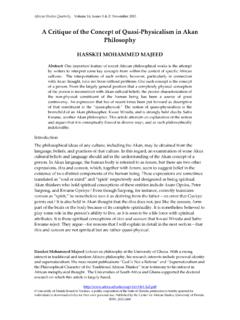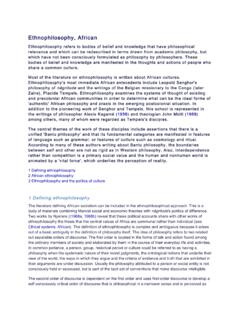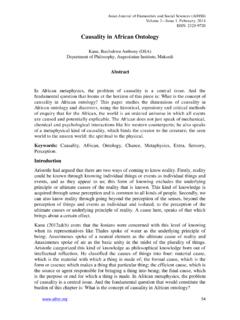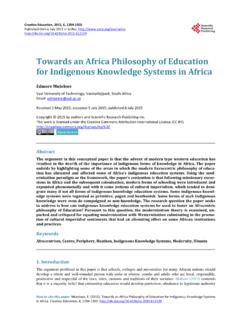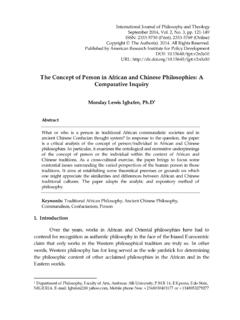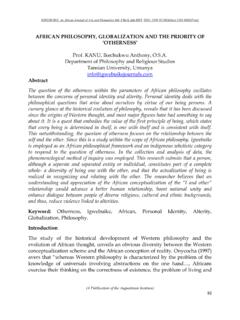Transcription of The African Philosophy of “Ubuntu” and Correctional ...
1 African Studies Association of Australasia and the Pacific (AFSAAP) Proceedings of the 38th AFSAAP Conference: 21st Century Tensions and Transformation in Africa, Deakin University, 28th-30th October, 2015 (Published February 2016) 1 The African Philosophy of Ubuntu and Correctional Education in South Africa: A case study Lineo Rose Johnson Department of Adult Education & Youth Development University of South Africa Email: & Prof Kofi Poku Quan-Baffour School of Educational Studies Department of Adult Education & Youth Development University of South Africa Email: Abstract The South Afri can hi story and circumstances have resulted in many famili es in South Afri ca living on the edge of sur vival.
2 Many young people who break the law have no basic education for employment and many have no source of livelihood and thus cannot make ends meet. While prison inmates have wronged other citizens through crimes, the African Philosophy of Ubuntu (forgiveness and love) reflected in this article addresses the love and forgiveness values. The young and adult offenders are offered Correctional education meant to equip them with knowledge and skills to show that, based on Ubuntu, they are forgiven and equipped with skills for livelihood. The article interrogates their perceptions on prison curriculum or Correctional education offered in South African Correctional centres, based on the African indigenisation principles.
3 In establishing what curriculum issues are addressed through teaching and learning activities, the study used the qualitative research method to interview 9 inmates participating in formal, non-formal and informal Correctional programmes offered in the three Correctional facilities in Pretoria, South Africa. Underpinning the study is the Ubuntu ecological systems theory on the effectiveness of the indigenised curriculum practices for African and community-based needs. While the majority of offenders attach value to the Correctional education offered, some believe the needs-based curriculum must emanate from their vocational and employment-based prerequisites.
4 The study recommends that curriculum offered in Correctional facilities in South Africa must promote the Philosophy of Ubuntu to solve the African crime levels; thus, it takes the whole village to raise a child . African Studies Association of Australasia and the Pacific (AFSAAP) Proceedings of the 38th AFSAAP Conference: 21st Century Tensions and Transformation in Africa, Deakin University, 28th-30th October, 2015 (Published February 2016) 2 Introduction In Africa, the rights and recourse for offenders pose a serious challenge due to developing economies that have limited resources. Issues discussed in this article embrace the African Philosophy of Ubuntu , a concept used in many indigenous knowledge studies in Africa and beyond.
5 This study is about nine offenders in three Correctional facilities in South Africa. The study investigated their perceptions as offenders on the curriculum embedded in the formal, non-formal and informal forms of Correctional education. The article uses a qualitative approach to research in which the nine offenders were selected and interviewed on their perceptions. Three Correctional officials and three ex-offenders also participated in the study to share their views on the spirit of Ubuntu and how it can positively influence the curriculum issues and the perceptions of the offenders. The African indigenous belief that it takes a whole village to raise a child , and in South Africa, that any child is my child came to prominence during the era of increasing political turmoil in South Africa prior to the dismantling of apartheid.
6 Any deviant behaviour displayed by children in society is regarded as a social problem, not of an individual family or clan but of the whole community. In African contexts, communities traditionally collectively raised children, to uphold the values of Ubuntu or botho. Lately, individualism where people mind their own business without any regard for what happens with their neighbour has become more evident. For a long time now, the South African leadership in all structures has been appealing to communities to build social cohesion, revive Ubuntu and the spirit of the African renaissance. This call was made after the realisation that Ubuntu Philosophy and values have become lip service in South African communities (Gumbo, 2014).
7 In the African context, family is the source of inspiration, socialisation and institution for moral and cultural beliefs. The absence of family units or dysfunctional families poses a challenge to normal, communal, collective spirit and crime-free indigenous societies (Indabawa & Mpofu, 2006). The Ubuntu Philosophy and indigenisation are highly regarded as virtues, and their absence culminates in disorderly and crime-riddled societies. This section, amongst other issues, raises the argument of whether the time has come for revisiting the African philosophies and values of Ubuntu in Africa. Ntseane (2011: 309) writes that the embodiment of the African Philosophy of Ubuntu epitomises the collective worldview, cultural and spirituality, shared orientation, collective responsibility and collective empowerment: Motho ke motho ka batho (a person is a person by the people).
8 The spirit of collectivism is what Ubuntu values are about. The African people have similar histories that were influenced by periods of colonialism, imperialism, social change and global capitalism, among others. These were experiences that made them fight for common cause and purpose. The high levels of crime in Africa are regarded as one of those social contemporary issues that make governments go back to the drawing board in curbing it. Policies and strategies are many and varied, and one of them that this article addresses is the spirit of Ubuntu. It is African Studies Association of Australasia and the Pacific (AFSAAP) Proceedings of the 38th AFSAAP Conference: 21st Century Tensions and Transformation in Africa, Deakin University, 28th-30th October, 2015 (Published February 2016) 3 against this backdrop that this study interrogates the African Philosophy and values of Ubuntu and how they can influence curriculum issues in Correctional education.
9 This study uses the social theory on the effectiveness of the indigenised curriculum practices for Africa, with particular emphasis on Correctional education. The study concludes that curriculum offered in Correctional facilities in South Africa must promote the Philosophy of Ubuntu to solve the African crime levels; thus, it takes the whole village to raise a child . Background to the study Collective measures to alleviate poverty in Africa have been pronounced in many African forums, and measures against crime have been regarded as top of the agenda in forums like the African Union (AU) and the New Partnership for Development in Africa (NEPAD).
10 In 2002, African countries converged in Burkina Faso. The plan of action for Africa, the Ouagadougou Declaration, formulated some priority areas related to ( Correctional ) education and its contribution to the rehabilitation and reintegration of offenders. The declaration considers that literacy and skills training should be linked to employment opportunities of offenders in incarceration and after; that Correctional education should embrace civic and social cohesion; that rehabilitation should provide social and psychological support with adequate professionals including educationists; and innovative strategies for reintegration of offenders into their society and communities should be explored, ( African Commission on Human and Peoples' Rights, 2002).
